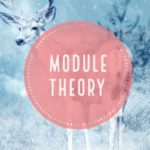Finitely Generated Torsion Module Over an Integral Domain Has a Nonzero Annihilator

Problem 432
(a) Let $R$ be an integral domain and let $M$ be a finitely generated torsion $R$-module.
Prove that the module $M$ has a nonzero annihilator.
In other words, show that there is a nonzero element $r\in R$ such that $rm=0$ for all $m\in M$.
Here $r$ does not depend on $m$.
(b) Find an example of an integral domain $R$ and a torsion $R$-module $M$ whose annihilator is the zero ideal.
Sponsored Links
Contents
Proof.
(a) Prove that the module $M$ has a nonzero annihilator.
Since $M$ is a finitely generated $R$-module, there is a finite set
\[A:=\{a_1, a_2, \dots, a_n\} \subset M\]
such that $M=RA$
As $M$ is a torsion $R$-module, for each $a_i\in A\subset M$ there is a nonzero element $r_i\in R$ such that
\[r_ia_i=0.\]
Let us put $r\in R$ to be the product of these $r_i$:
\[r:=r_1 r_2 \cdots r_n.\]
Note that $r$ is a nonzero element of $R$ since each $r_i$ is nonzero and $R$ is an integral domain.
We claim that the element $r$ annihilates the module $M$.
Let $m$ be an arbitrary element in $M$. Since $M$ is generated by the set $A$, we can write
\[m=s_1a_1+s_2a_2+\cdots +s_n a_n\]
for some elements $s_1, s_2, \dots, s_n\in R$.
Note that since $R$ is an integral domain, it is commutative by definition.
Hence we can change the order of the product in $r$ freely. Thus for each $i$ we can write
\[r=p_ir_i,\]
where $p_i$ is the product of all $r_j$ except $r_i$.
Then it follows that we have
\begin{align*}
ra_i&=p_ir_ia_i=p_i0=0 \tag{*}
\end{align*}
for each $i$.
Using this, we obtain
\begin{align*}
rm&=r(s_1a_1+s_2a_2+\cdots +s_n a_n)\\
&=rs_1a_1+rs_2a_2+\cdots +rs_n a_n\\
&=s_1ra_1+s_2ra_2+\cdots +s_n ra_n && \text{as $R$ is commutative}\\
&=s_10+s_20+\cdots +s_n 0 && \text{by (*)}\\
&=0.
\end{align*}
Therefore, for any element $m\in M$ we have proved that $rm=0$.
Thus the nonzero element $r$ annihilates the module $M$.
(b) Find an example of an integral domain $R$ and a torsion $R$-module $M$ whose annihilator is the zero ideal.
Let $R=\Z$ be the ring of integers. Then $R=\Z$ is an integral domain.
Consider the $\Z$-module
\[M=\oplus_{i=1}^{\infty}\Zmod{2^i}.\]
Then each element $a\in M$ can be written as
\[a=(a_1+\Zmod{2}, a_2+\Zmod{2^2}, \dots, a_k+\Zmod{2^k}, 0, 0, \dots)\]
for some $a_1, a_2, \dots, a_k\in \Z$.
(Here $k$ depends on $a$.)
It follows that we have
\[2^ka=0,\]
and thus $M$ is a torsion $\Z$-module.
We now prove that any annihilator of $M$ must be the zero element of $R=\Z$.
Let $r\in \Z$ be an annihilator of $M$.
Choose an integer $k$ so that $r < 2^k$.
Consider the element
\[a=(0, 0, \dots, 1+\Zmod{2^k}, 0, 0, \dots)\]
in $M$. The only nonzero entry of $a$ is at the $k$-th place.
Since $r$ is an annihilator, we have
\begin{align*}
0=ra=(0, 0, \dots, r+\Zmod{2^k}, 0, 0, \dots)
\end{align*}
and this implies that $r=0$ because $r < 2^k$.
We conclude that the annihilator is the zero ideal.
 Add to solve later
Add to solve later
Sponsored Links










